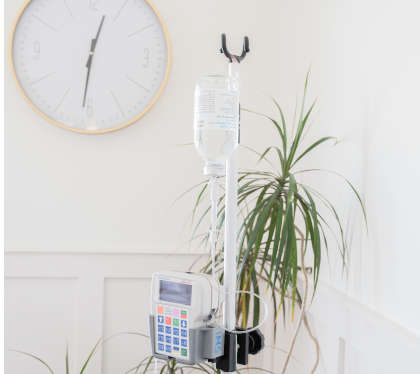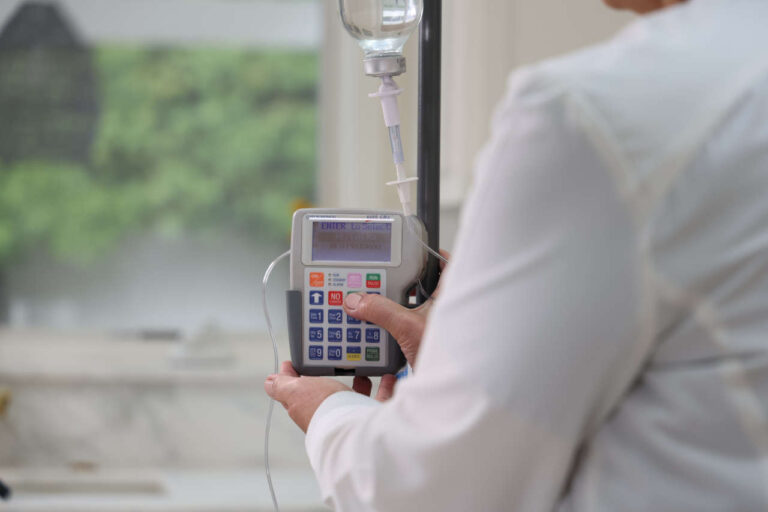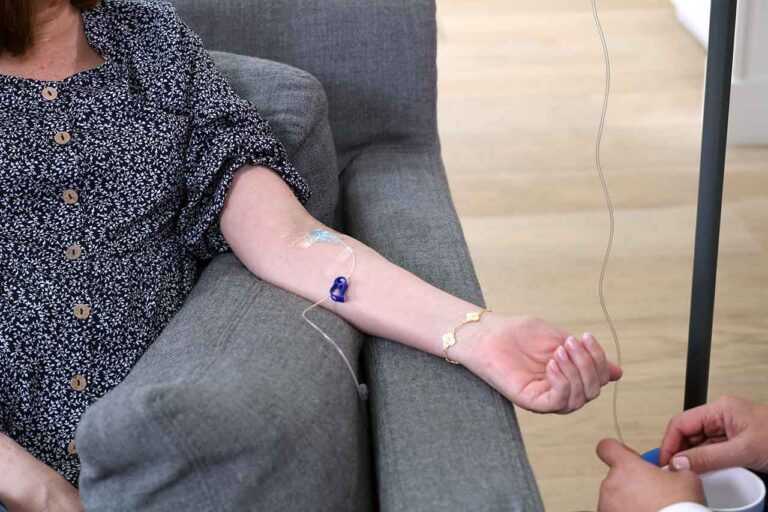
Home infusion therapy (HIT) is a safe and effective alternative that allows patients to receive medications and treatment in the comfort of their homes rather than in a hospital setting. In recent years, patient preference for home infusion therapy has increased tremendously because of the personalized, convenient, and high-quality care it provides.
Ask About IVIG Home Infusion
Sa katunayan, studies have shown that patients who received infusions at home reported better health outcomes, including lower infection rates and faster recovery times.
Therefore, if you have a chronic illness that can be monitored and managed at home, you can switch to home infusion therapy by consulting your healthcare provider.
In this article, we will take a closer look at home infusion therapy, its potential benefits, types, and some common challenges to consider before transitioning from hospital settings to home care.
Home Infusion Therapy
Patients with chronic illnesses or those recovering from surgery can receive medications (such as antibiotics, biologics, steroids, or clotting factors), fluids, or nutrition in the comfort of their homes.
A trained home infusion nurse or a caregiver administers the prescribed medication or fluids directly into the patient’s body either subcutaneously (under the skin) or intravenously (via IV catheter into the veins).
Every year, over 1.2 million infusion courses are administered at home via peripherally inserted central catheters (PICCs), ports, or central catheters.
Potential Benefits of Home Infusion Therapy
Home infusion therapy offers numerous benefits over hospital infusion settings, which makes this therapy an attractive option for patients. Some of the significant benefits of opting for home infusion therapy are as follows:
1. Convenience and Comfort
One of the major advantages of home infusion therapy is that it provides comfort to patients. With home infusion therapy, a patient can receive their daily prescribed doses or nutrition in the comfort of their home, surrounded by loved ones. In addition, this therapy reduces hospital visits. Patients who have mobility issues or who live far from medical centers can save time, energy, and travel expenses.
In terms of convenience, home infusion therapy offers flexibility to patients who require regular or long-term infusions. This therapy allows them to easily incorporate treatments into their daily routine without disrupting their professional and personal activities.
2. Personalized Care and Improved Patient Outcomes
Each patient requires personalized care according to their disease condition. Home infusion therapy offers personalized and patient-centered care, where you will work closely with your healthcare provider to develop treatment plans according to your specific medical needs and preferences.
Also, this personalized care approach improves the patient’s overall health and allows healthcare providers to monitor the patient’s daily improvements and manage side effects (if they occur).
3. Cost Effectiveness
Home infusion therapy is typically less expensive than inpatient infusion therapy, as it reduces the costs of hospital stays, room charges, and overhead expenses. However, the costs of home infusion and hospital infusion can differ depending on the type of disease being treated.
According to the National Home Infusion Center, an anti-infective infusion at home may cost $122/day, as opposed to $798/day for inpatients. Similarly, a systematic review of 253 articles reported that the cost of home infusions was substantially less than infusions at a medical facility. For example, hemophilia patients can save anywhere from $1,928 to $2,974 for each course of treatment.
Home Infusion – We Come To You
4. Reduced Exposure to Infectious Environments
With home infusion therapy, you will have less exposure to infectious environments. It is therefore a better option for individuals who have compromised immune systems. Unlike hospital and clinical infusion settings, which are the hotspots for pathogens and infectious diseases, home infusion therapy provides a clean and safe environment with reduced exposure to infectious agents.
In some cases, patients receiving infusions at home may get infections when proper aseptic techniques are not followed. However, the overall rate of infections among patients receiving infusions at home is generally lower compared to hospital infusion settings.
Some common infections that may occur due to a poor hygienic environment are catheter-associated bacterial infections and central-line–associated bloodstream infections.
5. Improved Quality of Life
Patients who receive infusion therapy at home are more likely to experience improved quality of life. With home therapy, patients feel more independent. In addition, spending time with loved ones improves their emotional health and gives them a more optimistic view of their therapeutic path.
Common Types of Home Infusion Therapies

There are several common types of home infusion therapies, which are given to patients according to their condition:
IV Antibiotic therapy
This therapy is typically used to treat resistant infections like osteomyelitis (inflammation in the bone), endocarditis, and certain skin infections. Home antibiotic infusion allows patients to avoid prolonged hospital stays.
Pain Management
Individuals recovering from surgery or having chronic pain may receive pain management therapy at home, where analgesics or anesthetics are infused to control pain.
Immunoglobulin (IVIG) therapy
IVIG therapy is typically recommended to treat immune-related conditions and can be administered at home to individuals who require regular infusions for a long period.
Chemotherapy Treatment
Certain chemotherapy treatments can be given at home when the patient’s condition is stable, and they do not require intensive monitoring.
Cardiac/Inotropic Therapies
Patients with heart failure or cardiogenic shock receive medication through a continuous IV line infusion at home to make their heart muscles contract normally.
Hydration Therapy
This therapy provides vitamins, fluids, and medication directly into the patient’s bloodstream to provide rapid relief from hangovers, jet lag, fatigue, and dehydration.
Nutritional Support (TPN/EN)
Individuals with compromised gastrointestinal function receive IV infusions of essential nutrients (proteins, carbs, vitamins, electrolytes, etc.) at home to fulfill their body’s nutrient requirements and prevent malnutrition.
Makipag-usap sa isang Espesyalista
Tungkol sa Tulong sa CopayEligibility Criteria for Home Infusion Therapy (HIT)
Not everyone is eligible for home infusion therapy. This option is only available to patients with stable conditions who can safely receive treatment at home. Home infusion therapy might be a good choice for:
- Patients who require long-term IV treatment due to chronic illnesses like infectious diseases, immune deficiency, sakit ni Crohn (gastrointestinal disease), rheumatologic disorders, autoimmune diseases, inflammatory conditions, and cancer.
- Patients with nutritional deficiencies or malabsorption.
- Patients who cannot access a healthcare facility due to mobility issues.
Challenges and Other Considerations
Although home infusion therapy offers several benefits, it also has some challenges that you must consider as a patient or caregiver to ensure the safety and effectiveness of this therapy.
1. Patient and Caregiver Training
Improper training can result in adverse outcomes or complications, such as issues with the central venous catheters used for infusions, catheter blockages, central-line infections, or medication errors. Therefore, you must receive proper training in administering medication, managing side effects, and handling equipment and medications.
2. Infection Risks
Poor hygiene can increase the risk of infection, including central line-associated bloodstream infections, venous thromboembolism, phlebitis, and occlusion. You can minimize or control the risks of infections by adhering to strict aseptic techniques.
Also, make sure you have a safe and secure place to store the medication and medical equipment.
3. Insurance Coverage
Home infusion therapy can be expensive if your insurance does not fully cover your medication and infusion equipment costs. Therefore, you must check your insurance plan before switching from a hospital setting to home care.
4. Psychological Stress and Burnout
You may feel isolated or stressed while managing the treatment independently. Burnout is also common among caregivers. Seeking counseling or taking breaks can help mitigate patient stress and burnout among caregivers.
Konklusyon
Home infusion therapy is an effective and safe approach for patients who are stable and eligible to receive treatment in the comfort of their homes. Along with the benefits, there are also some challenges to consider before initiating therapy.
If you or your loved one plans to switch to home infusion therapy, you should consult your healthcare provider to explore whether it is the right option for you.
MGA SANGGUNIAN:
- Fields, B. E., Whitney, R. L., & Bell, J. F. (2020). Managing home infusion therapy. AJN American Journal of Nursing, 120(12), 53–59. https://doi.org/10.1097/01.naj.0000724252.22812.a2
- Polinski, J. M., Kowal, M. K., Gagnon, M., Brennan, T. A., & Shrank, W. H. (2017). Home infusion: Safe, clinically effective, patient preferred, and cost saving. Healthcare, 5(1-2), 68-80. https://doi.org/10.1016/j.hjdsi.2016.04.004
- Rentala, M., Andrews, S., Tiberio, A., Alagappan, K., Tavdy, T., Sheppard, P., & Silverman, R. (2016). Intravenous Home Infusion Therapy Instituted From a 24-Hour Clinical Decision Unit For Patients With Cellulitis. The American Journal of Emergency Medicine, 34(7), 1273-1275. https://doi.org/10.1016/j.ajem.2016.04.022
- Gorski, L. A. (2019). The Impact of Home Infusion Therapies on Caregivers. Seminars in Oncology Nursing, 35(4), 370-373. https://doi.org/10.1016/j.soncn.2019.06.010
- Martel, D. (2012). Infusion therapy in the home care setting. Home Healthcare Nurse, 30(9), 506–514. https://doi.org/10.1097/nhh.0b013e31826a679c













